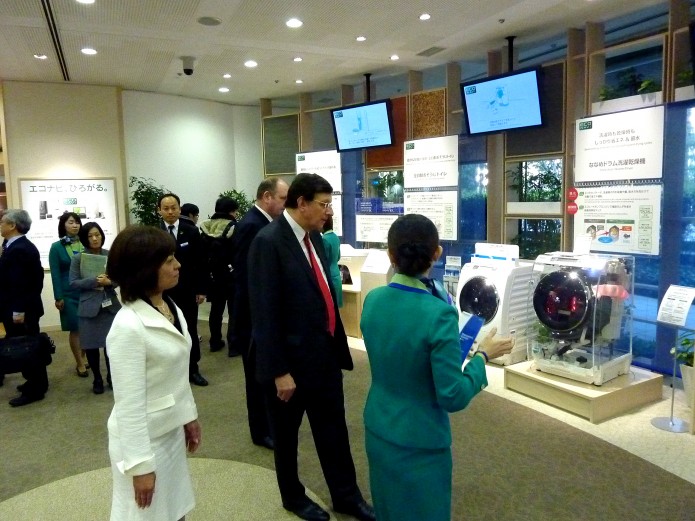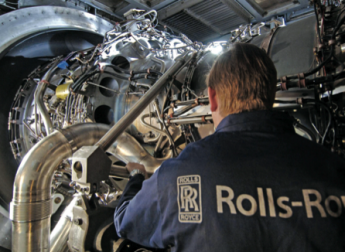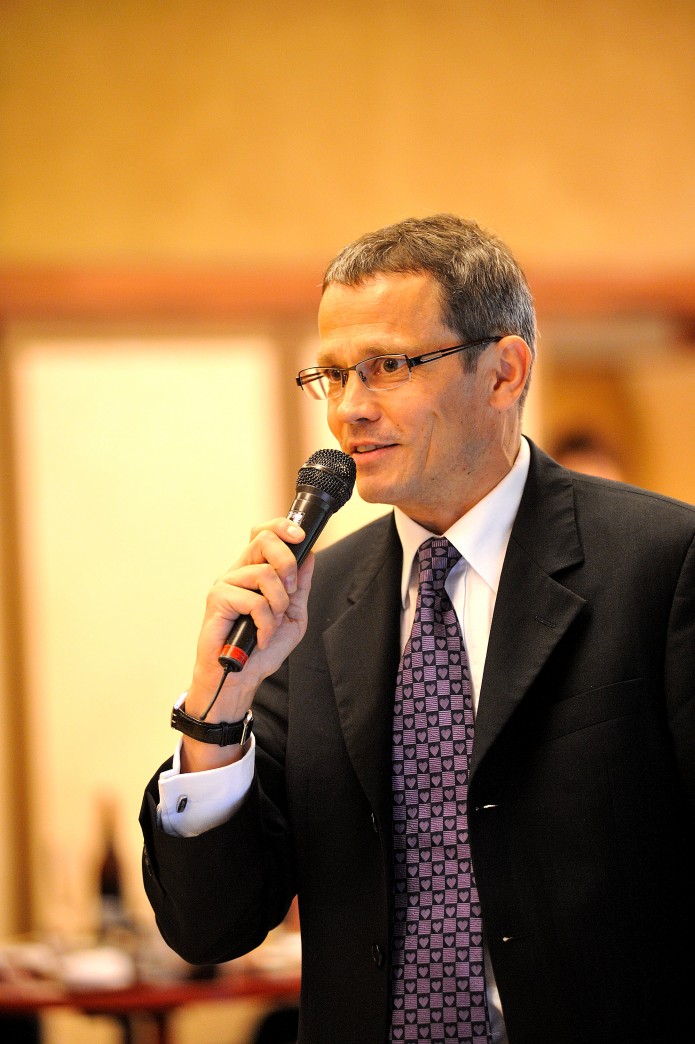Promoting two-way trade, investment between Britain and west Japan
Simon Fisher understands why Tokyo, as Japan’s political and financial heart, tends to dominate talk of the country’s commercial ties with Britain. But as the UK consul-general in Osaka, he knows, too, that the western part of Japan—stretching from Aichi Prefecture in the middle to Okinawa in the far south—plays a key role in bilateral trade and investment.
The consulate’s work centres on promoting Japanese investment into the UK and helping British firms enter Japan, but it also facilitates collaboration in science and innovation and offers consular help to British nationals.
The work of its 24 employees, two- thirds of whom are from UK Trade & Investment (UKTI), covers a broad spectrum: from consumer electronics, information technology, life sciences and renewable energy to joint projects involving both countries’ most prestigious universities.
“It’s fair to say that we wouldn’t be here if it weren’t for the trade and investment angle”, Fisher told BCCJ ACUMEN in July.
That is no exaggeration. The consulate is responsible for 29 prefectures, the major cities of Nagoya and Fukuoka, plus the huge Kansai conurbation of Osaka, Kyoto and Kobe, a region of 24 million people that accounts for almost 19% of Japan’s GDP.
While most Kansai exports are bound for Asia and the US, it enjoys healthy commercial ties with Britain, with which trade amounted to ¥61bn in 2009. Kansai’s economy is about the same size as that of the Netherlands, while the Chubu economy, centred on Nagoya, is comparable to that of South Korea.
Foreign direct investment in Japan represents a much smaller portion of the consulate’s workload, Fisher says, but adds that he and his colleagues perform an important role in advising British firms interested in setting up, or investing, in western Japan.
Last year, the UKTI team in Japan completed just over 100 investment projects— both new concerns and expansions of existing ones. “Our Osaka team delivered about half of those, and that’s been consistently the case over the past few years—about half from eastern and half from western Japan”, Fisher said.
The Kansai check
list includes the creation of 300 new jobs at Sharp Corporation’s solar panel factory in Wrexham, Wales, and the decision by Mizkan group Corporation, the Aichi Prefecture-based vinegar maker, to locate its global headquarters in west London.
Japan’s push to expand renewable energy in the wake of the Fukushima nuclear accident is expected to benefit British firms: the consulate’s science and innovation team is currently promoting British expertise in, among other things, combining various forms of renewable energy for integration into a grid, resulting in better management of energy supply to homes.

Ambassador David Warren recently visited Panasonic Corporation’s green-technology showroom at their Osaka headquarters.
“Panasonic, Kyocera, Sanyo and Sharp are among the high-tech electronics firms that are very interested in what the UK knows about home energy management, solar panels and so on”, Fisher said.
“We do a lot in that area, and there’s very good synergy here between the investment team and the science and innovation team. We benefit from being a small organisation, which allows us to operate as a single team”.
The UK not only offers expertise in the development of renewables: given its plans to increase the use of clean energy, it is also an attractive market. Mitsubishi Heavy Industries, for example, has put £100mn into a turbine research facility in Scotland.
“There’s a lot going on in terms of Japanese firms looking at the UK market, as well as at collaboration, and as a stepping-stone to the European market”, he added.
For Japanese firms—including those in the Kansai region—seeking a European base, London is an increasingly attractive proposition. “The UK benefits from the availability of skilled workers, especially in the London area, where there is such a variety of people, languages and skills”, Fisher said.
That reputation has helped Fisher in his attempts to sell the UK to Kansai firms, but he says there is no room for complacency.

Rolls-Royce gas-turbine technology helps power Maritime Self-Defence Force vessels.
“We can’t afford to relax because there’s a lot of competition from France, Germany, the Netherlands and Spain and, quite often, we talk to companies that have a shortlist of three or four and we have to persuade them to opt for the UK”, he said. “It comes down to us being able to put ourselves inside a company’s head and work out what it needs. And we’ve become quite good at that, I believe.
“It’s often overlooked just how much of Japan’s industrial base is outside Kanto. Certainly western Japan represents not that much less than half of the country’s economy”.
The region represents a massive pool of potential investors, including Toyota Motor Corporation and its many offshoots in Aichi, as well as aerospace and chemical firms in Osaka, with its experience hosting engineering, chemical, steel making and electronics firms. In addition, Kyoto, which is better known around the world as a cultural hub, has an impressive nexus of high- tech electronics firms.
“Most of those companies have significant investments in the UK”, said Fisher. “The [March] earthquake has accelerated pressure on Japanese companies to spread themselves out a bit more, and the UK has benefited from that”.
What of investment and interest flowing in the opposite direction? “It’s true to say that the vast majority of foreign companies chose to locate in Tokyo for obvious reasons, but there are a substantial number of UK companies in our half of Japan”, Fisher explained.
One notable presence in Kansai is AstraZeneca, the UK’s second-biggest pharmaceutical firm, which employs 3,000 people at its headquarters in Osaka, the traditional home of the Japanese pharmaceutical industry.
Then there is Rolls-Royce group plc, which has a long-standing relationship with Kawasaki Heavy Industries in Kobe, making mainly gas turbines for Maritime Self-Defence Force vessels; and Bodycote, the British thermal processing firm that has carved out a presence in the region’s car industry.

The Senken Shimbun reported in june that Topshop/Topman was one of the most successful stores in Osaka’s Lucua shopping complex.
In fashion, Topshop/Topman opened its first Osaka store in the Umeda neighbourhood in May, and plans a second outlet in the city’s Shinsaibashi district this autumn. And Osaka-based Yuzo Yagi was in June awarded an honorary OBE for his support of the industry through his firm, Yagi Tsusho Limited, which owns the Mackintosh, Barbour and J & M Davidson brands.
Finally, Berkshire-based PC Cox group, which designs and makes sealant applicators, recently won orders from Kansai.
The consulate’s annual IT mission from the UK, jointly organised with the Osaka Chamber of Commerce and Industry, has resulted in successful partnerships, and every Anglophile resident of Kansai knows about the annual Hankyu Department Store UK fair, where 150 UK brands generate sales of about ¥200mn in one week.
“On the trade side, most of what we do involves getting companies into the market”, Fisher said. “Some of them will end up investing in Japan and setting up an office here, and we may well help them with that—but our export support services are aimed at getting the right information to UK customers to help them decide whether they should come here”.
While Kansai and western Japan struggle to compete with Tokyo and the Kanto region in terms of influence and prestige,
Fisherbelieves locating to this unsung region makes sense under the right circumstances.
“It depends on the sector the company is in, and where their markets are”, he said. “But in a general sense, rents down here are considerably lower than in Tokyo, and there are some good incentive deals from local authorities who are trying to stop the drift to Tokyo.
Then there is the size of the local market. The Osaka-Kyoto-Kobe conurbation is set to grow and, eventually, join the Nagoya conurbation to become the biggest mega city in the world, with a population of about 60mn.
“The other attraction, of course, is the opportunity to interact with the warm, down-to-earth people from this part of Japan”, Fisher said.

